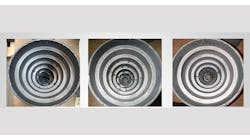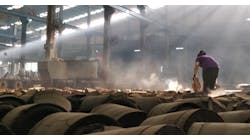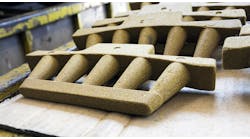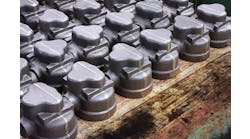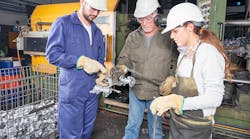Q: What resources are available for users of casting resins or binders to achieve process improvements and scrap reduction?
A: All foundries and core shops struggle with process improvements and problematic or defective castings. These struggles range from process-related issues to resin or binder-use problems.
Increasingly, metalcasting operations require managers and operators to have advanced practical knowledge of chemistry. Foundry sand is typically treated with resin binders to aid in retaining a mold’s dimensional standards while also effectively managing the heat dissipation from the molten metal as it solidifies
Commonly used resins in metalcasting include phenol-formaldehyde, phenolic-urethane, and furan formulations, but recognizing the various features and advantages of such choices so as to achieve a foundry’s production targets and quality standards demands more insight and experience than most managers and operators have on hand.
ASK Chemicals offers technical support from multiple different resource groups for a more holistic approach to selecting and applying resins and binders, and improvements in the application of these products to a particular foundry operation.
These groups range from Technical Services, Research and Development, Technical Product Management and Design Services, and offer a wide range of expertise to foundries or core shops. Additionally, these resources can draw upon hundreds of years of experience among engineers and technicians throughout the organization to deliver a value proposition for scrap and process cost reductions.
How can these resources be accessed? They are available upon request. An ASK Chemicals representative will work with you to analyze specific or multiple applications or processes within the foundry or core shop to determine the best solution possible.
It is important to note that these specialists do not work independent of the customer foundry or core shop but with the internal resources available there. Recommendations from proven best practices can be implemented or scientific test plans can be developed.
Specific value propositions may also be created by the technical service resource, using internal enterprise applications (e.g., The Profit Improvement Plan Application) that allows them to define and detail any process within the foundry or core shop. After the technician has defined the process and determined the best solution, he then will take the information provided by the foundry or core shop and generate a report for the foundry and/or core shop that details the path forward.
Lastly, after the process improvement plan has been determined the technician will work with the foundry or core shop to implement the solution. It is important to verify with data that the process improvement provides the solution and cost reduction that was sought by the foundry and/or core shop.
Capabilities of the technical resources include (but are not limited to) process audits, new equipment start-up, analytical analysis, simulation services and support, best product fit, metal application lab, sand analysis, metallurgical analysis, new foundry support, environmental support (permitting), on-site training, and Casting Academy.
Join the Conversation. Email Your Questions for ASK Chemicals Share your insights, opinions, and elaborate on the questions and the experts' answer(s). You must be logged in to the website in order to post your comments.

